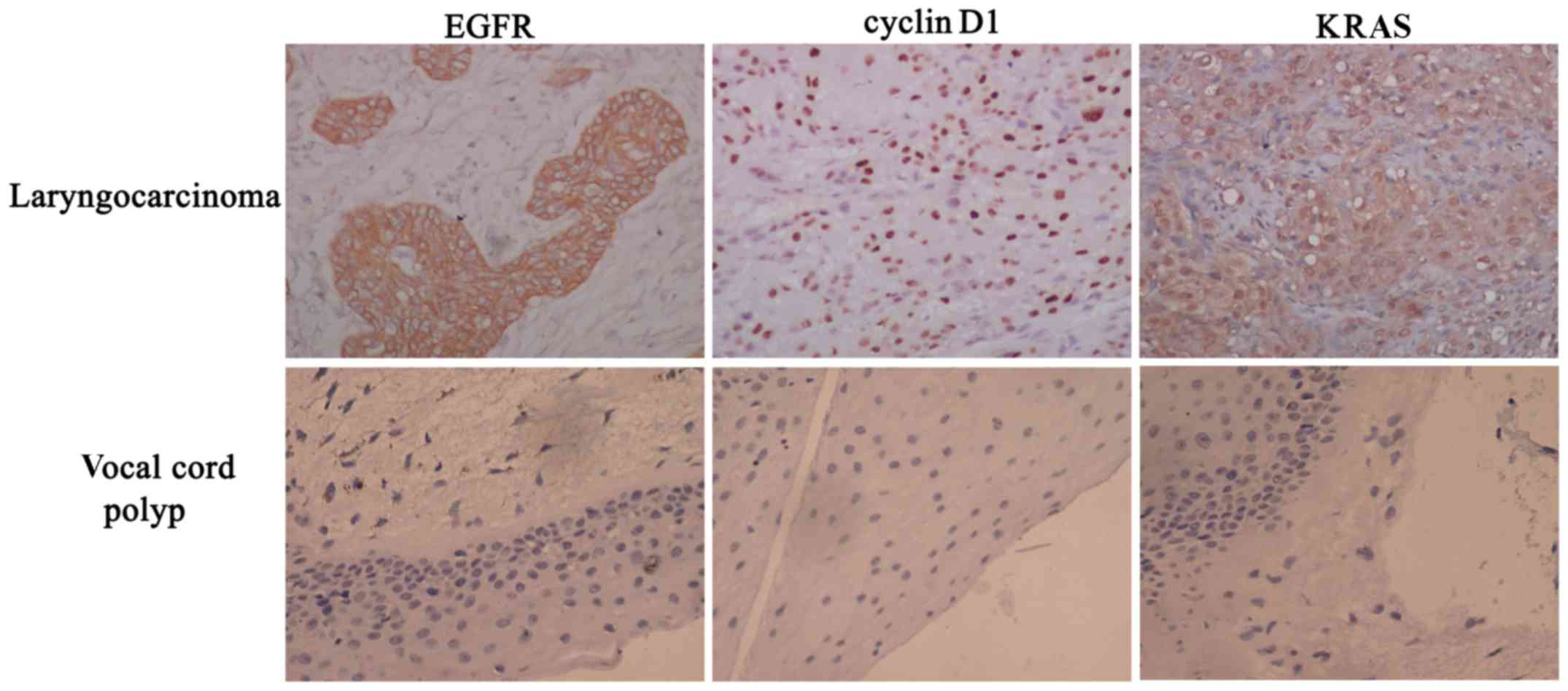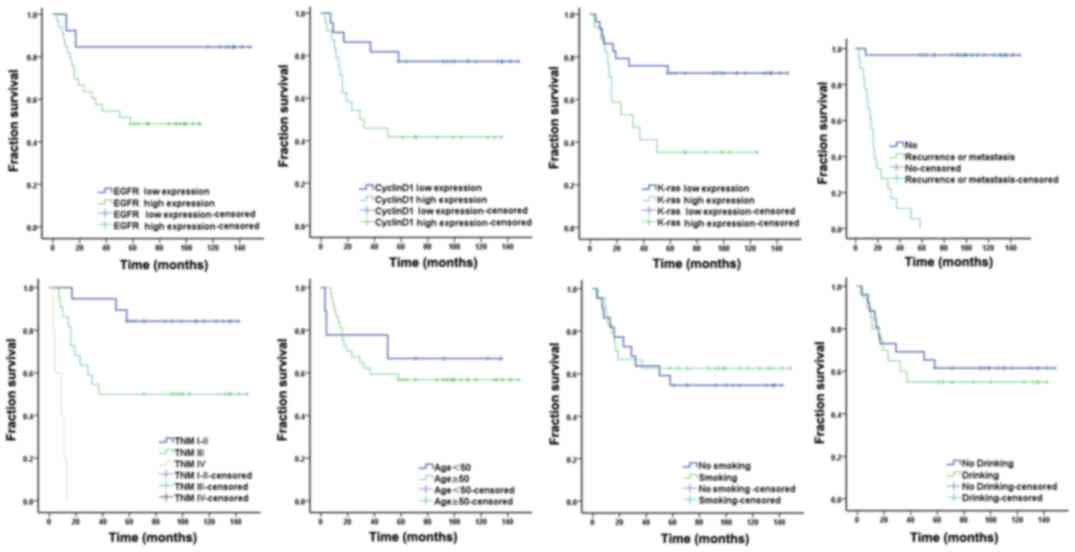|
1
|
Zhi L, Wenli W, Pengfei G, Pengcheng C,
Wenxian C, Jiasheng L and Yongzhu S: Laryngotracheal reconstruction
with autogenous rib cartilage graft for complex laryngotracheal
stenosis and/or anterior neck defect. Eur Arch Otorhinolaryngol.
271:317–322. 2014. View Article : Google Scholar : PubMed/NCBI
|
|
2
|
Britt CJ and Gourin CG: Contemporary
management of advanced laryngeal cancer. Laryngoscope Investig
Otolaryngol. 2:307–309. 2017. View
Article : Google Scholar : PubMed/NCBI
|
|
3
|
Alterio D, Marvaso G, Maffini F, Gandini
S, Chiocca S, Ferrari A, Preda L, Rocca MC, Lepanto D, Fodor C, et
al: Role of EGFR as prognostic factor in head and neck cancer
patients treated with surgery and postoperative radiotherapy:
Proposal of a new approach behind the EGFR overexpression. Med
Oncol. 34:1072017. View Article : Google Scholar : PubMed/NCBI
|
|
4
|
Cho KJ, Jeong SU, Kim SB, Lee SW, Choi SH,
Nam SY and Kim SY: Basaloid squamous cell carcinoma of the head and
neck: Subclassification into basal, ductal and mixed subtypes based
on comparison of clinico-pathologic features and expression of p53,
Cyclin D1, epidermal growth factor receptor, p16 and human
papillomavirus. J Pathol Transl Med. 51:374–380. 2017. View Article : Google Scholar : PubMed/NCBI
|
|
5
|
Paliga A, Onerheim R, Gologan A, Chong G,
Spatz A, Niazi T, Garant A, Macheto D, Alcindor T and Vuong T: EGFR
and K-ras gene mutation status in squamous cell anal carcinoma: A
role for concurrent radiation and EGFR inhibitors? Br J Cancer.
107:1864–1868. 2012. View Article : Google Scholar : PubMed/NCBI
|
|
6
|
Bellacosa A, Almadori G, Cavallo S, Cadoni
G, Galli J, Ferrandina G, Scambia G and Neri G: Cyclin D1 gene
amplification in human laryngeal squamous cell carcinomas:
Prognostic significance and clinical implications. Clin Cancer Res.
2:175–180. 1996.PubMed/NCBI
|
|
7
|
Trivedi S, Rosen CA and Ferris RL: Current
understanding of the tumor microenvironment of laryngeal dysplasia
and progression to invasive cancer. Curr Opin Otolaryngol Head Neck
Surg. 24:121–127. 2016. View Article : Google Scholar : PubMed/NCBI
|
|
8
|
Takes RP, Baatenburg de Jong RJ, Schuuring
E, Hermans J, Vis AA, Litvinov SV and van Krieken JH: Markers for
assessment of nodal metastasis in laryngeal carcinoma. Arch
Otolaryngol Head Neck Surg. 123:412–419. 1997. View Article : Google Scholar : PubMed/NCBI
|
|
9
|
Shin DM, Ro JY, Hong WK and Hittelman WN:
Dysregulation of epidermal growth factor receptor expression in
premalignant lesions during head and neck tumorigenesis. Cancer
Res. 54:3153–3159. 1994.PubMed/NCBI
|
|
10
|
Horn F, Henze C and Heidrich K:
Interleukin-6 signal transduction and lymphocyte function.
Immunobiology. 202:151–167. 2000. View Article : Google Scholar : PubMed/NCBI
|
|
11
|
Gospodarowicz MK, Brierley JD and
Wittekind C: TNM classification of malignant tumours. John Wiley
& Sons. 2017.
|
|
12
|
Sigismund S, Avanzato D and Lanzetti L:
Emerging functions of the EGFR in cancer. Mol Oncol. 12:3–20. 2018.
View Article : Google Scholar : PubMed/NCBI
|
|
13
|
Tetsu O, Phuchareon J, Eisele DW, Hangauer
MJ and McCormick F: AKT inactivation causes persistent drug
tolerance to EGFR inhibitors. Pharmacol Res. 102:132–137. 2015.
View Article : Google Scholar : PubMed/NCBI
|
|
14
|
Moeini A, Sia D, Bardeesy N, Mazzaferro V
and Llovet JM: Molecular pathogenesis and targeted therapies for
intrahepatic cholangiocarcinoma. Clin Cancer Res. 22:291–300. 2016.
View Article : Google Scholar : PubMed/NCBI
|
|
15
|
Zhang S, Li Y, He X, Dong S, Huang Y, Li
X, Li Y, Jin C, Zhang Y and Wang Y: Photothermolysis mediated by
gold nanorods modified with EGFR monoclonal antibody induces Hep-2
cells apoptosis in vitro and in vivo. Int J Nanomedicine.
9:1931–1946. 2014.PubMed/NCBI
|
|
16
|
Cao S, Xia M, Mao Y, Zhang Q, Donkor PO,
Qiu F and Kang N: Combined oridonin with cetuximab treatment shows
synergistic anticancer effects on laryngeal squamous cell
carcinoma: Involvement of inhibition of EGFR and activation of
reactive oxygen species-mediated JNK pathway. Int J Oncol.
49:2075–2087. 2016. View Article : Google Scholar : PubMed/NCBI
|
|
17
|
Kang N, Zhang JH, Qiu F, Tashiro S,
Onodera S and Ikejima T: Inhibition of EGFR signaling augments
oridonin-induced apoptosis in human laryngeal cancer cells via
enhancing oxidative stress coincident with activation of both the
intrinsic and extrinsic apoptotic pathways. Cancer Lett.
294:147–158. 2010. View Article : Google Scholar : PubMed/NCBI
|
|
18
|
Hwang H, Biswas R, Chung PS and Ahn JC:
Modulation of EGFR and ROS induced cytochrome c release by
combination of photodynamic therapy and carboplatin in human
cultured head and neck cancer cells and tumor xenograft in nude
mice. J Photochem Photobiol B. 128:70–77. 2013. View Article : Google Scholar : PubMed/NCBI
|
|
19
|
Gioacchini FM, Alicandri-Ciufelli M,
Kaleci S, Magliulo G, Presutti L and Re M: The prognostic value of
cyclin D1 expression in head and neck squamous cell carcinoma. Eur
Arch Otorhinolaryngol. 273:801–809. 2016. View Article : Google Scholar : PubMed/NCBI
|
|
20
|
Pletneva MA, Andea A, Palanisamy N, Betz
BL, Carskadon S, Wang M, Patel RM, Fullen DR and Harms PW: Clear
cell melanoma: A cutaneous clear cell malignancy. Arch Pathol Lab
Med. 138:1328–1336. 2014. View Article : Google Scholar : PubMed/NCBI
|
|
21
|
Qie S and Diehl JA: Cyclin D1, cancer
progression, and opportunities in cancer treatment. J Mol Med
(Berl). 94:1313–1326. 2016. View Article : Google Scholar : PubMed/NCBI
|
|
22
|
Casimiro MC, Velasco-Velazquez M,
Aguirre-Alvarado C and Pestell RG: Overview of cyclins D1 function
in cancer and the CDK inhibitor landscape: Past and present. Expert
Opin Investig Drugs. 23:295–304. 2014. View Article : Google Scholar : PubMed/NCBI
|
|
23
|
Pignataro L, Pruneri G, Carboni N,
Capaccio P, Cesana BM, Neri A and Buffa R: Clinical relevance of
cyclin D1 protein overexpression in laryngeal squamous cell
carcinoma. J Clin Oncol. 16:3069–3077. 1998. View Article : Google Scholar : PubMed/NCBI
|
|
24
|
Xiao Y, Wang J, Lu J, Liu Y, Wang Y, Gao Y
and Jin D: Down-regulation of cyclin D1 by small interfering RNA
inhibits cell growth and induces apoptosis of laryngeal squamous
cell carcinoma. Am J Otolaryngol. 32:541–546. 2011.PubMed/NCBI
|
|
25
|
Feng J, Sun Q, Wu T, Lu J, Qu L, Sun Y,
Tian L, Zhang B, Li D and Liu M: Upregulation of ATF-3 is
correlated with prognosis and proliferation of laryngeal cancer by
regulating Cyclin D1 expression. Int J Clin Exp Pathol.
6:2064–2070. 2013.PubMed/NCBI
|
|
26
|
Li MH, Tian LL, Ren H, Chen XX, Wang Y, Ge
JC, Wu SL, Sun Y, Liu M and Xiao H: MicroRNA-101 is a potential
prognostic indicator of laryngeal squamous cell carcinoma and
modulates CDK8. J Transl Med. 13:2712015. View Article : Google Scholar : PubMed/NCBI
|
|
27
|
Akkiprik M, Celikel CA, Düşünceli F,
Sönmez O, Güllüoğlu BM, Sav A and Ozer A: Relationship between
overexpression of ras p21 oncoprotein and K-ras codon 12 and 13
mutations in Turkish colorectal cancer patients. Turk J
Gastroenterol. 19:22–27. 2008.PubMed/NCBI
|
|
28
|
Haigis KM, Kendall KR, Wang Y, Cheung A,
Haigis MC, Glickman JN, Niwa-Kawakita M, Sweet-Cordero A,
Sebolt-Leopold J, Shannon KM, et al: Differential effects of
oncogenic K-Ras and N-Ras on proliferation, differentiation and
tumor progression in the colon. Nat Genet. 40:600–608. 2008.
View Article : Google Scholar : PubMed/NCBI
|
|
29
|
Nussinov R, Tsai CJ and Jang H: A new view
of pathway-driven drug resistance in tumor proliferation. Trends
Pharmacol Sci. 38:427–437. 2017. View Article : Google Scholar : PubMed/NCBI
|
|
30
|
Asati V, Mahapatra DK and Bharti SK: K-Ras
and its inhibitors towards personalized cancer treatment:
Pharmacological and structural perspectives. Eur J Med Chem.
125:299–314. 2017. View Article : Google Scholar : PubMed/NCBI
|
|
31
|
Zampino MG, Magni E, Sonzogni A and Renne
G: K-ras status in squamous cell anal carcinoma (SCC): It's time
for target-oriented treatment? Cancer Chemother Pharmacol.
65:197–199. 2009. View Article : Google Scholar : PubMed/NCBI
|
|
32
|
Shin KH, Bae SD, Hong HS, Kim RH, Kang MK
and Park NH: miR-181a shows tumor suppressive effect against oral
squamous cell carcinoma cells by downregulating K-ras. Biochem
Biophys Res Commun. 404:896–902. 2011. View Article : Google Scholar : PubMed/NCBI
|
|
33
|
Van Damme N, Deron P, Van Roy N, Demetter
P, Bols A, Van Dorpe J, Baert F, Van Laethem JL, Speleman F,
Pauwels P and Peeters M: Epidermal growth factor receptor and K-RAS
status in two cohorts of squamous cell carcinomas. BMC Cancer.
10:1892010. View Article : Google Scholar : PubMed/NCBI
|
|
34
|
van der Schroeff JG, Evers LM, Boot AJ and
Bos JL: Ras oncogene mutations in basal cell carcinomas and
squamous cell carcinomas of human skin. J Invest Dermatol.
94:423–425. 1990. View Article : Google Scholar : PubMed/NCBI
|
|
35
|
Hoa M, Davis SL, Ames SJ and Spanjaard RA:
Amplification of wild-type K-ras promotes growth of head and neck
squamous cell carcinoma. Cancer Res. 62:7154–7156. 2002.PubMed/NCBI
|
|
36
|
Chen X, Kong W, Cai G, Zhang S and Zhang
D: The expressions of K-ras in human laryngeal squamous cell
carcinoma cell lines (Hep-2) and its significance. Lin Chuang Er Bi
Yan Hou Ke Za Zhi. 19:417–419. 2005.(In Chinese). PubMed/NCBI
|
|
37
|
Ruíz-Godoy RLM, Garcia-Cuellar CM, Herrera
González NE, Suchil BL, Pérez-Cárdenas E, Sácnchez-Pérez Y,
Suárez-Roa ML and Meneses A: Mutational analysis of K-ras and Ras
protein expression in larynx squamous cell carcinoma. J Exp Clin
Cancer Res. 25:73–78. 2006.PubMed/NCBI
|
|
38
|
Shang C, Guo Y, Fu S, Fu W and Sun K:
SH3GL2 gene participates in MEK-ERK signal pathway partly by
regulating EGFR in the laryngeal carcinoma cell line Hep2. Med Sci
Monit. 16:BR168–BR173. 2010.PubMed/NCBI
|
|
39
|
Zhang B, Liu W, Li L, Lu J, Liu M, Sun Y
and Jin D: KAI1/CD82 and CyclinD1 as biomarkers of invasion,
metastasis and prognosis of laryngeal squamous cell carcinoma. Int
J Clin Exp Pathol. 6:1060–1067. 2013.PubMed/NCBI
|
|
40
|
Chrysovergis A, Gorgoulis VG, Giotakis I,
Tsiambas E, Karameris A, Kittas C and Kyroudi A: Simultaneous over
activation of EGFR, telomerase (h TERT) and cyclin D1 correlates
with advanced disease in larynx squamous cell carcinoma: A tissue
microarray analysis. Med Oncol. 28:871–877. 2011. View Article : Google Scholar : PubMed/NCBI
|
|
41
|
Ramnani DM, Wistuba II, Behrens C, Gazdar
AF, Sobin LH and Albores-Saavedra J: K-ras and p53 mutations in the
pathogenesis of classical and goblet cell carcinoids of the
appendix. Cancer. 86:14–21. 1999. View Article : Google Scholar : PubMed/NCBI
|
|
42
|
Papadimitrakopoulou V, Izzo JG, Liu DD,
Myers J, Ceron TL, Lewin J, William WN Jr, Atwell A, Lee JJ,
Gillenwater A, et al: Cyclin D1 and cancer development in laryngeal
premalignancy patients. Cancer Prev Res (Phila). 2:14–21. 2009.
View Article : Google Scholar : PubMed/NCBI
|
|
43
|
Ferlay J, Soerjomataram I, Dikshit R, Eser
S, Mathers C, Rebelo M, Parkin DM, Forman D and Bray F: Cancer
incidence and mortality worldwide: Sources, methods and major
patterns in GLOBOCAN 2012. Int J Cancer. 136:E359–E386. 2015.
View Article : Google Scholar : PubMed/NCBI
|
















